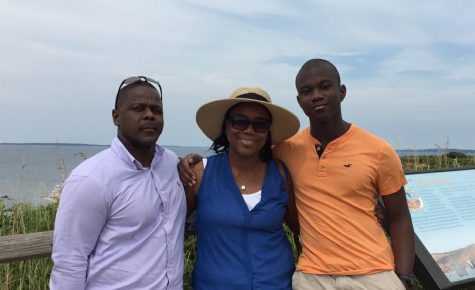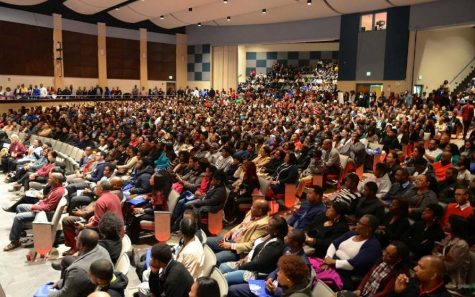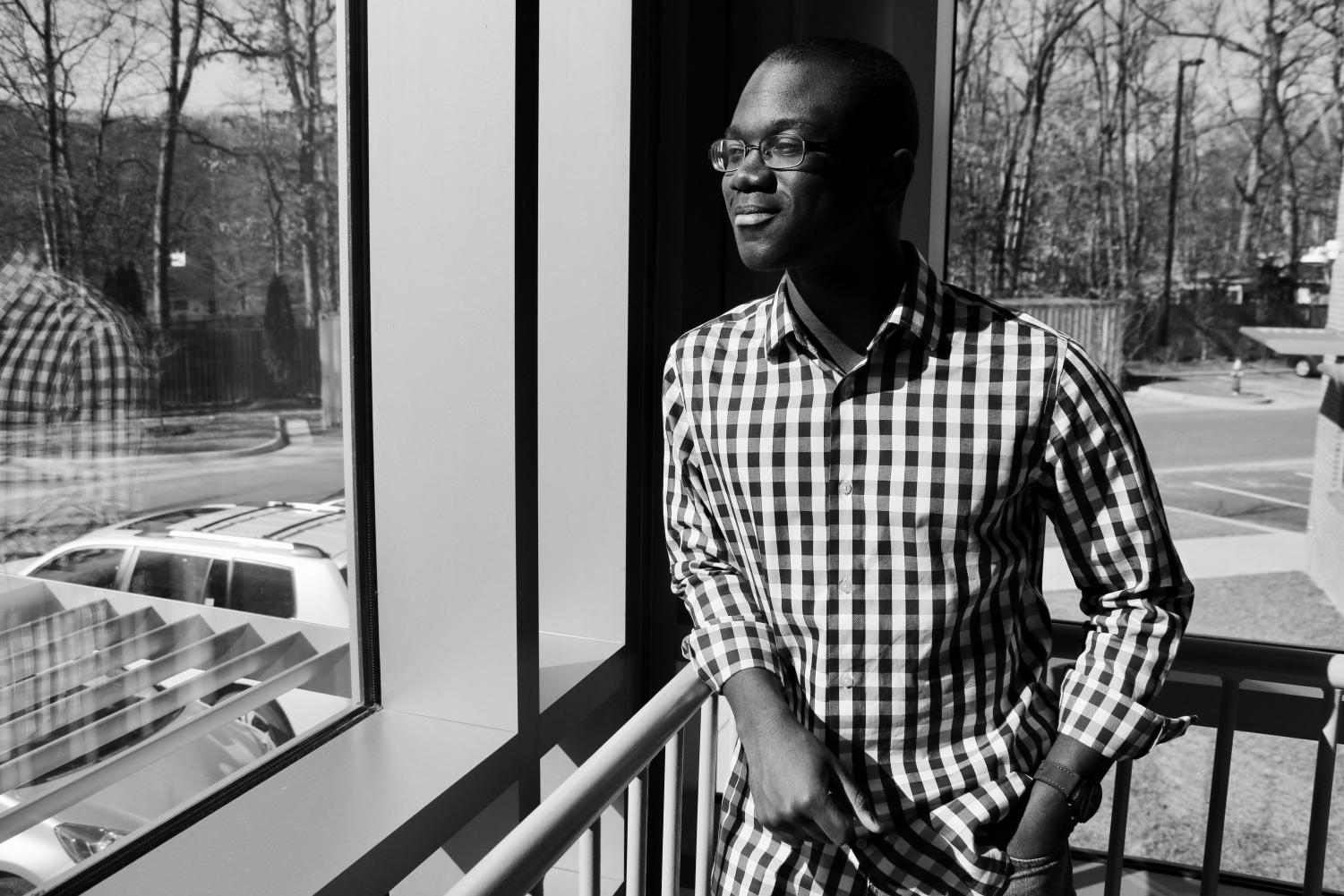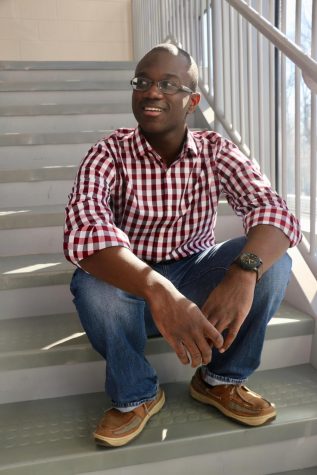Reconstructing the Past
Senior Camdyn Davis utilizes his family's history and his encounters with confusion to inform his actions in bringing diversity to Jefferson
February 10, 2018
Senior Camdyn Davis can trace his origins back to a patch of land in the deep South.
This ancestry is a source of pride for his family: it’s part of their oral history that’s been passed down from generation to generation. The land granted to Davis’ great-great-grandfather stems from a principle Davis likens to the “40 Acres and a Mule” declaration: given an area of farmland in Georgia, Davis’ family depended on its fruits as subsistence for three generations.
That’s when his mother’s side of the family made the switch from an agrarian to an urban way of life. That’s when his grandparents decided to move down to Florida to raise their children. Their strong emphasis on their children’s education is what ultimately allowed his father to shoot for high aspirations, eventually landing a career in the military and moving out of Florida to complete his duties.

Davis stands with his parents, Consondra and Willie Davis, during a summer break trip to Nantucket.
“[My dad] was accepted to colleges like Dartmouth, but he knew because of finances that it wasn’t an option for him, he would’ve been in a pretty large debt for the rest of his life, so he chose the military instead,” Davis said. “I’m where I am now because my dad joined the military and that was a great way to get out of that area [of Florida] to an even better one. Without his sacrifice, I wouldn’t be able to come here.”
On the other hand, though Davis remains proud of his roots, there is also an unmistakable pain that’s associated with an ancestry rooted in racism and segregation: there is a pain in the ignorance of experience, a pain associated with his peers’ lack of awareness of the realistic conditions of being African-American, especially when he is part of a minority in a predominantly Asian and white school.
“In history class when we’re talking about the slave trade, everyone kind of glances at you because you’re the only one that’s black and you understand why it happens. Or when we’re talking about race in [Young Democrats], everyone looks at you for your opinion because you’re the only black person here.”
While reading Their Eyes Were Watching God in English 11 last year, Davis was often asked: is this what an African-American family is like? “Their Eyes Were Watching God” focuses on the life of Janie Crawford, a woman on a quest for love; her mother and grandmother had both begot children after being raped, and with an absent mother and an anxious grandmother, Crawford was initially pushed her into a miserable arranged marriage with a financially stable farmer named Logan Killicks. From there, the book delves into Crawford’s subsequent marriages, from her abusive, 20-year relationship with Joe Starks to the death of her husband, Tea Cakes.
In response to those inquiries, Davis would explain that one book and one family didn’t represent most African-American families. He believes those questions are well-meaning but do originate from a fundamental ignorance about their way of life.
“I sometimes feel like I’m the representative for the entirety of my race,” Davis said. “People will ask: what do black people think about this? Why do black people do this? I kind of have that obligation to explain why all black people believe in whatever or that we don’t and have different opinions. It’s kind of frustrating that there’s this level of ignorance, but at the same time, …I recognize it could be worse. I just think they don’t know and I think I have a duty to educate my peers.”
It’s Not Race, It’s Expectations
One advice that Davis gives to his peers is looking at situations with a more open mind. People aren’t defined by their race or all their beliefs, so a black student growing up in Northern Virginia can have a drastically different experience than a black student in downtown Washington D.C.
Davis’ own father is currently a teacher in inner D.C. public schools. What his dad has witnessed there helps him contextualize the issues he’s faced here at Jefferson. There, the students are carefully monitored and secured: multiple security guards are posted around entrances with metal scanners ensuring that no weapons are brought into the school. In contrast, Jefferson hires one security and resource (SRO) officer, Officer Richards. According to Davis, the entire culture surrounding D.C. public schools can stymie achievement, a culture that’s been historically compounded because of race.
“It’s partly a student’s problem, it’s partly a social problem that they don’t have a chance,” Davis said. “I think [the social problem] has been there for the longest time because of race; their parents thought the same way and their parents thought the same way and none of their parents really had a chance to pass down that idea.”
Unlike graduating seniors here, black students living in D.C. are expected to support their family right out of high school. “Most of them can’t even think about college because of finances; most of them expect to get a mediocre job that’s low-paying and doesn’t have a lot of opportunity for progression,” Davis said. “They grew up with another expectation for their future which is the first problem and the education system there isn’t as good there; they aren’t being taught skills that are useful in the same way. They’re being taught the most basic level of math and they aren’t being told there’s more so they never really know they can do better.”
Because of his observations, Davis largely appreciates the supportive teachers he’s had throughout his life. With their support, he says, he’s managed to land in the best programs and advance to the greatest potential. In particular, his middle school math teacher was the first to introduce him to the TJ admissions process, a process he was unaware of since he moved to Lorton in seventh grade; due to his dad’s military background, Davis lived in Germany and another area of Virginia for most of his life.
“I didn’t actually recognize the weight of the admissions process when I was going through it; it wasn’t until I came to TJ and knew that a lot of people spent a lot of time reviewing for it and attending summer programs,” Davis said. “I remember on the test day, we were comparing the notes and all the practice they’d done. I was really confused about it because I never knew that it was so serious. For me, it was just a cool program that maybe I could apply to.”
Since then, he’s noticed the lack of representation in the student body: in the past three years, African-American representation in the incoming class has hovered around 1.5%. Though he was initially offended by racially intolerant statements and can occasionally still experience uncomfortable situations, his attitude has gradually shifted over time as he recognizes his position as an opportunity to educate others.
“Now I can recognize when they’re non-intentionally cruel and I can solve the problem and I can educate now when before, I would just take offense,” Davis said. “I realized at TJ most students don’t hold many prejudices and I could do more by staying calm. Getting upset didn’t help anyone, but if I explain clearly most people understand.”
One of his initiatives, which works to increase representation from within, is associated with his involvement in the Black Student Union, bringing the possibility of Jefferson to more racially diverse middle schools like his own, South County Middle School. Increasing awareness of Jefferson as a viable option is “a good step to having more African-American students in the school.”
“We’re trying to bring more black people in because it’s a matter of exposure,” Davis said. “At a lot of racially diverse schools and low-income schools, they just don’t know about it. There’s a panel that’s supposed to go out to these schools and they’ll recognize that those people don’t even know what TJ is whereas schools like Robinson will have all these interest meetings and everyone knows about it. I feel like that’s part of the problem.”

Another subtler reason is familiarity: since their numbers are low at Jefferson, students from African-American backgrounds simply exist within different zones of interaction which can influence how comfortable they feel enrolling here.
“We’re all in our different bubbles. Even I, being in TJ for 4 years, I don’t have that much interaction with black people besides church and family because this is my bubble to an extent,” Davis said. “I understand how this happens and I’m not even upset about it, it’s just disheartening sometimes.”
To address this, he encourages all students, not just prospective applicants, to venture outside their comfort zone and socialize with people who are different from them.
“If we’re out in a place where we can interact with people of other races, do it; don’t stick to your own,” Davis said. “I don’t think it’s necessarily racism that’s causing them to do it; I would say it’s familiarity, that you kind of stick with people similar to you, so just be conscious of the biases we all have.”
In addition, another long-term plan he suggests echoes the mission statements of many an outreach plan: start early when students are young to foster a love for the subjects specialized here. According to Davis, funding for these programs would be more effective than allocating spaces to increase representation and should start as early as fifth grade.
“Because of the high stress of TJ, I worry about allotting the spots because that would make it a very difficult four years, because even very smart people at this school get very stressed out about TJ,” Davis said. “I think the best idea is to go into communities and prepare them for TJ and help them at that lower level, so they might not necessarily choose to go to TJ, but if they’re taught that there’s something else they can do these kids may have the motivation and skills needed for TJ.”
Subscribe to the Online Series
[subscribe2]

